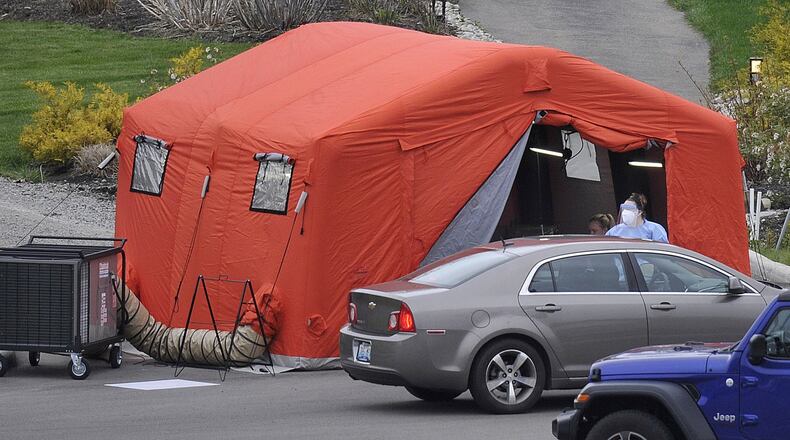“Your capabilities are tied to what kind of machines you have … Each machine of each type of test requires a different solution for that virus to grow. And then to further complicate it, each sample has a different type of swab or collection device. It is very complex when people say we need more testing,” Weimer said.
The quality of a testing device for the new coronavirus largely depends on two factors: How sensitive the test is at picking up the virus (and not incorrectly reading negative when it’s actually present), and how specific it is at detecting the coronavirus it’s looking for (and not incorrectly reading positive).
Some of the newer testing options that can get patients answers at the point of care rapidly have had poor sensitivity and specificity and unreliable results.
Because this virus spread so quickly in the United States, Dr. Joseph Allen, with Premier Health’s test collection site, said the same infrastructure wasn’t in place like there is for reliable flu tests.
“A lot of them aren’t vetted very well. They don’t have a lot of great data behind them. Even the ones that do have great data, their sensitivity and specificity are pretty crummy,” Allen said.
Talking last week, Allen said health systems only have been getting allocated so much chemical reagent, and when they run out have to wait for another allocation. They also need sterile solution to put the swabs in.
“We didn’t have enough test kits initially so we had to be very careful about how many we were running a day and screen folks out who really needed the testing,” Allen said.
These supply issues should ease in May, according to the DeWine administration, which announced Friday several testing supply deals to boost Ohio’s capacity from 3,700 to 22,000 daily tests by late May.
Another drive-through testing site started in the region this week when Kroger Health said it would start having COVID-19 drive-through testing sites through the end of May, working with Kettering Health Network for logistics.
Test results are expected within approximately 48 hours. The Kroger Health testing site on the campus of Kettering Medical Center will handle approximately 330 tests per day.
Gov. Mike DeWine said the increase in testing availability will also mean more testing in nursing homes.
The long-term care industry has been clamoring for more tests to help with prevention and containment as nursing homes and assisted living facilities have an out-sized number of outbreaks, placing both residents and staff at risk. Supply challenges in personal protective equipment have further exacerbated the ability to contain the spread.
Two-thirds of U.S. nursing homes still don’t have “easy access to test kits” and are struggling to obtain sufficient resources, Chris Laxton, executive director of the Society for Post-Acute and Long-Term Care Medicine, told the Associated Press.
As of Friday morning, only one governor, West Virginia’s Jim Justice, appears to be mandating testing for all nursing homes without conditions. Detroit Mayor Mike Duggan ordered tests at all 26 nursing in the city, using new kits that can spew out results in 15 minutes. Massachusetts abruptly halted a program to send test kits directly to nursing homes this week after 4,000 of them turned out to be faulty. New Hampshire teamed with an urgent-care company to test care workers. Several states including Colorado, Florida, Maryland, Tennessee and Wisconsin have dispatched National Guard testing strike teams.
Associated Press contributed to this story.
About the Author
